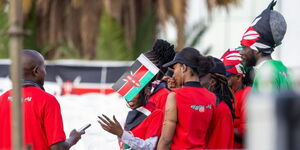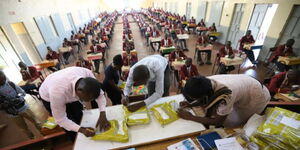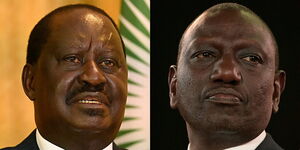Students in institutions of higher learning have mastered the dubious art of acquiring good grades and even graduating with top-class degrees without breaking a sweat.
The deep-rooted vice has even earned today students an extra nickname; the copy-paste generation! Most of them will attest to the magic of highlight, control C, and control V: copy and paste.
Copy-pasting which can be described as plagiarism is not new in academia. It involves copying and pasting academic work by someone else without giving them credit.
Cases of academic dishonesty have increasingly become rampant, with both undergraduate and postgraduate students falling victims.
A university student who spoke to Kenyans.co.ke on anonymity, affirmed that it is the most used shortcut in doing assignments and other research papers.
The student noted that copy-pasting culture is largely due to laziness and love for shortcuts.
"Right now let me tell you, no one can sit down and write an academic paper or assignment from scratch. That is tiresome. Materials are all over the internet, you just have to be smart," the student noted.
"Most of my fellow students don't have that time to go to the library, it feels like an old school thing, who does that anyway? I think it is kinda backwards to fail to graduate because of failing to submit your assignment yet you have a smartphone and access to the internet," the student confined to Kenyans.co.ke.
In 2012, when one of the plagiarism-detection software was launched, it proved that almost 50 per cent of the materials subjected for academic purposes was copy-pasted.
In September 2019, Kenyatta University (KU) revoked a PhD degree awarded to a lecturer, not even a student, after it was discovered that he had copy-pasted a thesis belonging to a Nigerian Don.
KU was even forced to discontinue the lecturer who was teaching at that time at the Department of Social Sciences.
"The KU lecturer had been awarded a PhD on August 4, 2018, for a thesis he had submitted. Upon receipt of the complaint, the VC set up a committee to review the validity of the claims," a statement released by the institution read.
This vice happens despite many of the institutions having clear guidelines against it. For instance, in KU, they launched their guideline in 2020, Anti-plagiarism Policy and Guidelines, that goes up to 2022.
The guideline seeks to address the gap in the Intellectual Property Rights Policy. Although the institutions recognise that there are proven and documented cases where existing information is being used without referencing and footnoting the owners, the policy seeks to enhance academic authenticity.
In their, list of penalties for those who are found replicating other people's work include restricting the students from submitting their papers for review for six months.
In cases where copy-pasting are discovered before graduation, the student is not conferred with his/her degree and then suspended for a period of one year. In some extreme cases, the University Council may even discontinue the student.
But with the harsh penalties involved, still, some students manage to copy and paste their way to degrees.
"In the case, the plagiarism is discovered at Graduate school in the process of examination, the Degree shall not be awarded and the student shall not be allowed to present another thesis for examination for the next one year. If heavier penalties are preferred, Graduate-School Kenyatta University procedures shall be discontinued," part of their policy reads.
A graduate who spoke to Kenyans.co.ke noted that in Kenya students are only taught to pass examinations. This has since become an ingrained culture so one wants to go those extra miles when doing their assignments. They only use the shortest way possible to get it done.
"In Kenya, we are taught to pass exams not to gain knowledge. So rarely was I ever excited about doing an assignment thinking that I want to research it and do proper work. I just wanted to use whatever means necessary to get a good grade," the graduate told Kenyans.co.ke.
Lawyer Christian Andole of Mumma and Company advocates states that country at the moment does not have clear laws guiding the prosecution of cases involving plagiarism.
He argued that various institutions, internally form their rules guiding copy-pasting crime.
"Various institutions have different rules of dealing with such cases. Mostly they allow at least 13-15 per cent of copied work to pass. You cannot authoritatively state that one has a monopoly of knowledge," he stated.
Andole added, "Even If such a case is filed by an institution, the student may still argue that the content was not being used for commercial purposes, depending on the amount of content is considered copied."
The lawyer noted in such an instance, a student defends himself using the 'fair use' justification.
So according to him, most University students get away with those offences and there is nothing different education stakeholders can do about it.
"At the moment most institutions just prefer small punishments because there is nothing big that can be done to prosecute students."
A lecturer who also spoke about the issue of copy and pasting remarked that it has reduced the value of research and most students are getting away with it.
He further noted that even lecturers in some institutions find themselves handling a huge number of students, so much so that checking for details to establish if submitted work is copy and pasted becomes difficult.
"At the moment, most institutions are understaffed. This has even made it difficult for tutors and lecturers to check and filter out copy and pasted work. As a result, most students have graduated easily without struggling," the lecturer insisted.
He added, "students don't really have that passion to explore and gain knowledge. They just want to get good grades and graduate so that they can get jobs and just continue with their lives without having to struggle much."
As a result, most students copy and paste their way to academic success, only to meet their waterloo while in an interlectually-demanding workforce.












